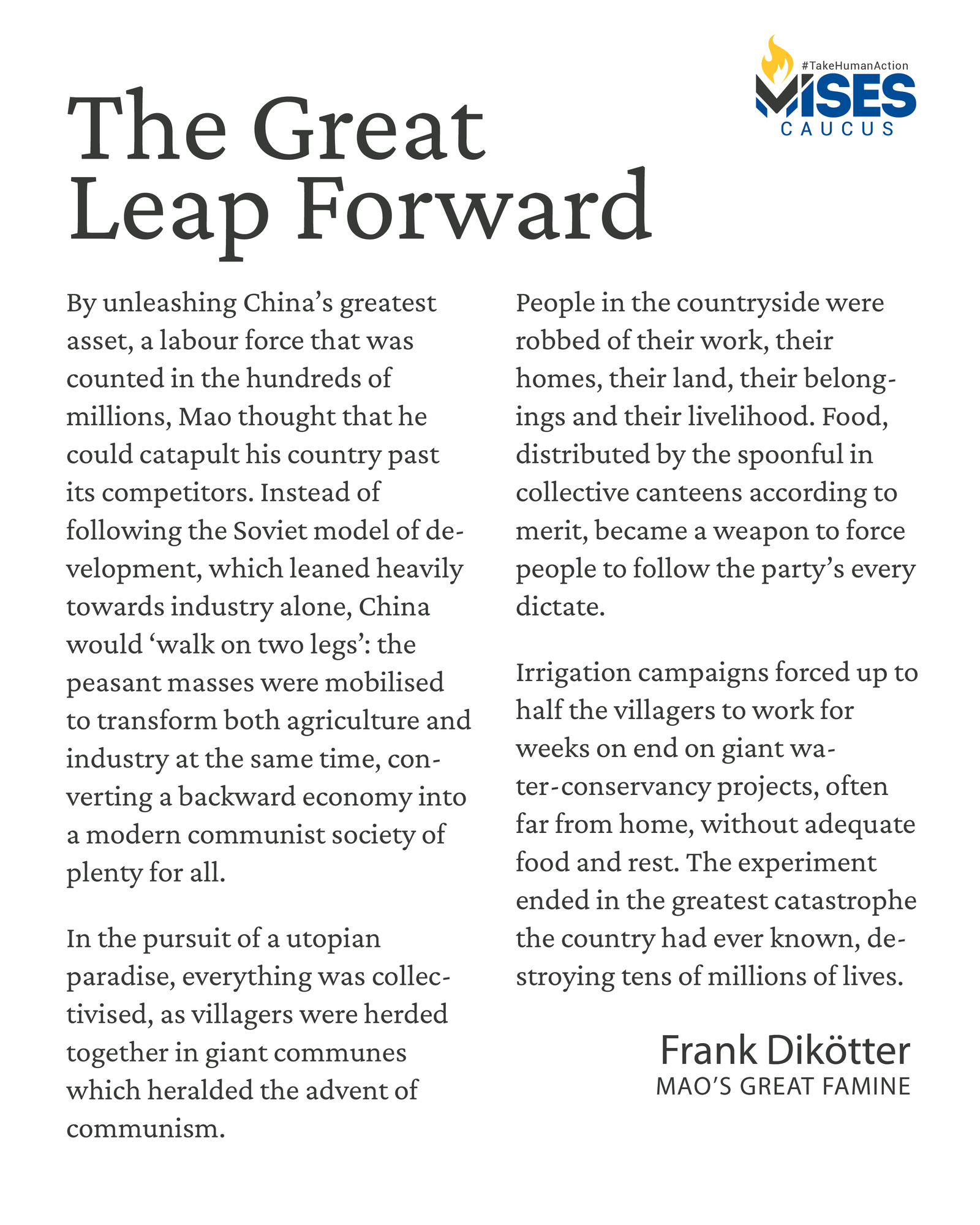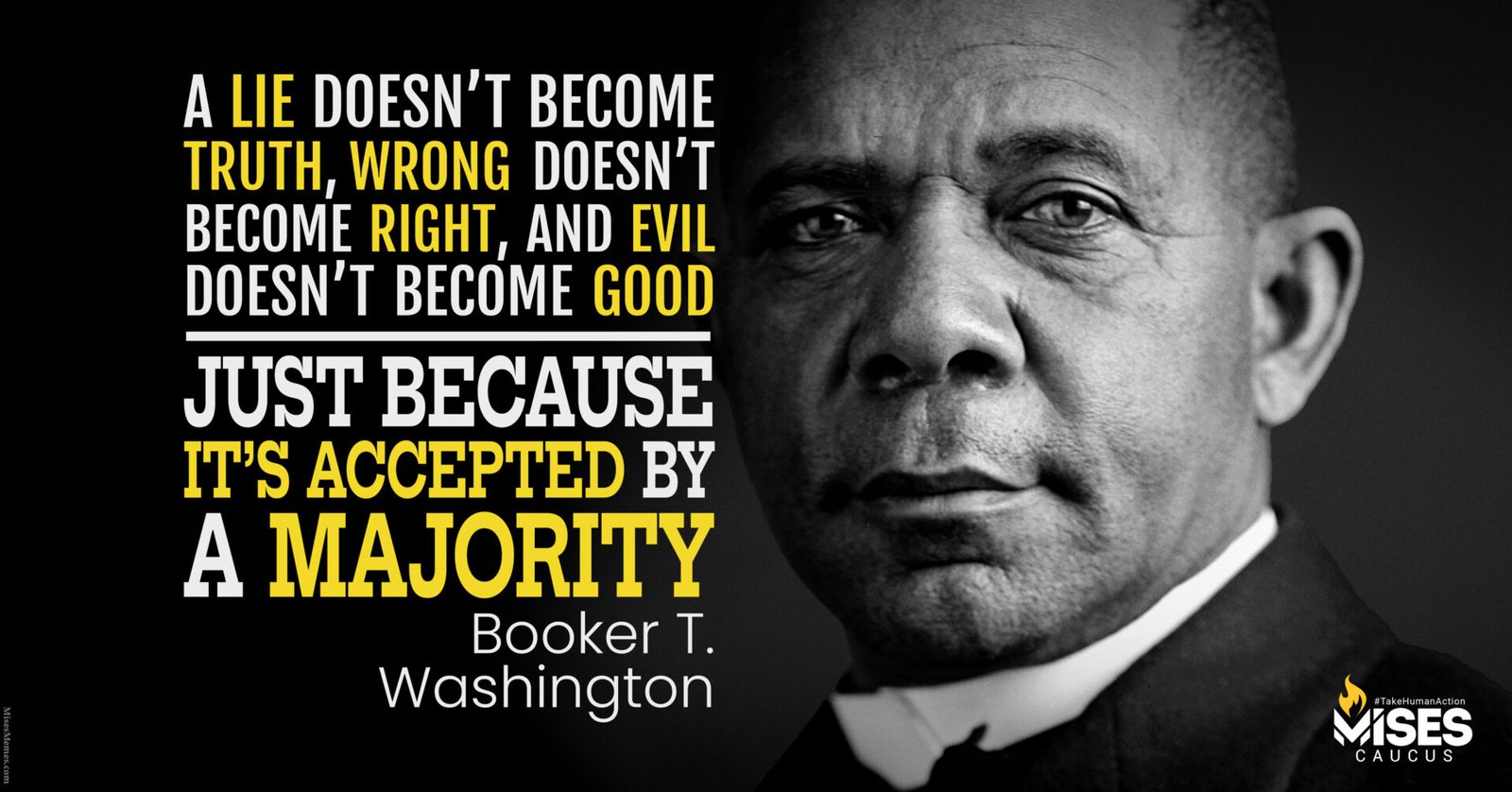Many on the political left are so entranced by the beauty of their vision that they cannot see the ugly reality they are creating in the real world. —Thomas Sowell


Many on the political left are so entranced by the beauty of their vision that they cannot see the ugly reality they are creating in the real world. —Thomas Sowell

Not all collectivists are racists, but all racists are collectivists. —Shawn Hickman

“Planning” in political rhetoric is the government’s suppression of other people’s plans by superimposing on them a collective plan, created by third parties, armed with the power of government and exempted from paying the costs that these collective plans impose on others. —Thomas Sowell

By unleashing China’s greatest asset, a labour force that was counted in the hundreds of millions, Mao thought that he could catapult his country past its competitors. Instead of following the Soviet model of development, which leaned heavily towards industry alone, China would ‘walk on two legs’: the peasant masses were mobilised to transform both agriculture and industry at the same time, converting a backward economy into a modern communist society of plenty for all.
In the pursuit of a utopian paradise, everything was collectivised, as villagers were herded together in giant communes which heralded the advent of communism.
People in the countryside were robbed of their work, their homes, their land, their belongings and their livelihood. Food, distributed by the spoonful in collective canteens according to merit, became a weapon to force people to follow the party’s every dictate.
Irrigation campaigns forced up to half the villagers to work for weeks on end on giant water-conservancy projects, often far from home, without adequate food and rest. The experiment ended in the greatest catastrophe the country had ever known, destroying tens of millions of lives.
—Frank Dikötter, Mao’s Great Famine

This is a story of Zhao Xiaobai, then aged eleven, a soft-spoken woman with sad eyes. A few years before the Great Leap Forward her family left their native village in Henan to join a migration programme. Her father was made to break ice in the mountains but died of hunger in 1959. Her mother was too ill to work.
One of the local cadres came to the house, banging on the door to announce that slackers would not be fed. Another local bully came at night, pestering her mother for sexual favours. In the end, exhausted, her mother gave up and committed suicide.
Surrounded by strangers speaking an alien dialect, Zhao and her sister aged six ended up living with an uncle. ‘He was reasonable towards me, because I was old enough to go out and work. But he was not nice to my sister.
One day, as it was freezing, my sister came home empty-handed. So he beat her on the head, and she bled pretty badly.’
To protect her sister from her uncle’s abuse, Zhao took the six-year-old with her as she went to work like an adult, digging canals and ploughing fields. Here too she was unsafe. ‘Once, as I was working, I heard my little sister crying, and I saw somebody hurting her. Somebody was using sand balls to hit my sister, and she was surrounded by clumps of sand. Her eyes were covered in grit, and she just cried and cried.’
When asked how she had become the woman she is now, Zhao Xiaobai answered without hesitation: ‘Through suffering.’
—Frank Dikötter, Mao’s Great Famine

At what exact point, should one resist? When one’s belt is taken away? When one is ordered to face into a corner? When one crosses the threshold of one’s home?
How we burned in the camps later, thinking: What would things have been like if every Security operative, when he went out at night to make an arrest, had been uncertain whether he would return alive and had to say good-bye to his family? Or if during periods of mass arrests, as for example in Leningrad, when they arrested a quarter of the entire city, people had not simply sat there in their lairs, paling with terror at every bang of the downstairs door and at every step on the staircase, but had understood they had nothing left to lose and had boldly set up in the downstairs hall an ambush of half a dozen people with axes, hammers, pokers, or whatever else was at hand?
The Organs would very quickly have suffered a shortage of officers and transport and, notwithstanding all of Stalin’s thirst, the cursed machine would have ground to a halt!
If … if … We didn’t love freedom enough. We purely and simply deserved everything that happened afterward.
—Aleksandr Solzhenitsyn, The Gulag Archipelago

It isn’t a coincidence that governments everywhere want to educate children. If the government’s propaganda can take root as children grow up, those kids will be no threat to the state apparatus — they’ll fasten the chains to their own ankles. —Lew Rockwell

A lie doesn’t become truth, wrong doesn’t become right, and evil doesn’t become good, just because it’s accepted by a majority. —Booker T. Washington

Libertarianism is rejected by the modern Left, which preaches individualism but practices collectivism. Capitalism is rejected by the modern Right, which preaches enterprise but practices protectionism. —Karl Hess (The Death of Politics)

The practical problem is we have, historically, been so beaten down by the state, from kings and emperors, presidents and bureaucrats, that we now accept the lash of compulsion, so long as we can preserve the illusion that the whip was constructed with our consultation. Our debate is cordoned off into a small rhetorical space, where we discuss who is allowed to wield the whip this year or next year. We line up to vote for someone who will whip us less, and our adversaries more, but we never question the whip itself. —Robert Weir (WhyNotLibertarianism.com)
The practical problem is we have, historically, been so beaten down by the state, from kings and emperors, presidents and bureaucrats, that we now accept the lash of compulsion, so long as we can preserve the illusion that the whip was constructed with our consultation. Our debate is cordoned off into a small rhetorical space, where we discuss who is allowed to wield the whip this year or next year. We line up to vote for someone who will whip us less, and our adversaries more, but we never question the whip itself. —Robert Weir (WhyNotLibertarianism.com)